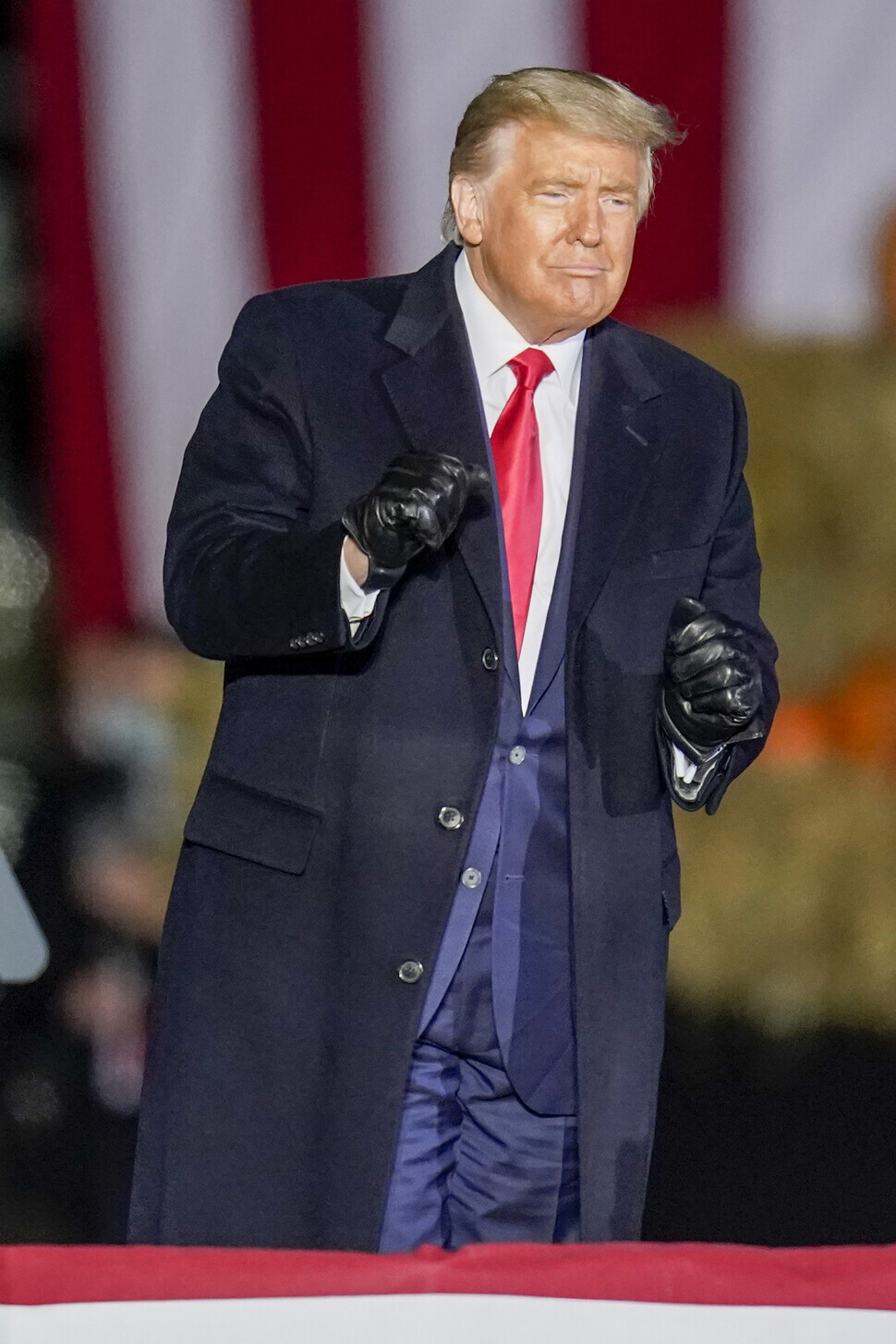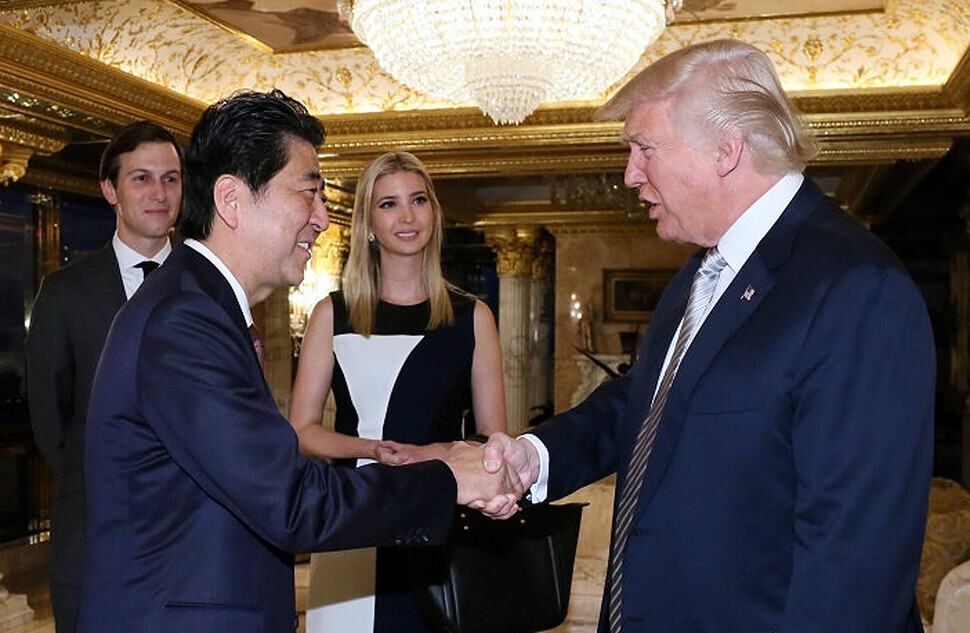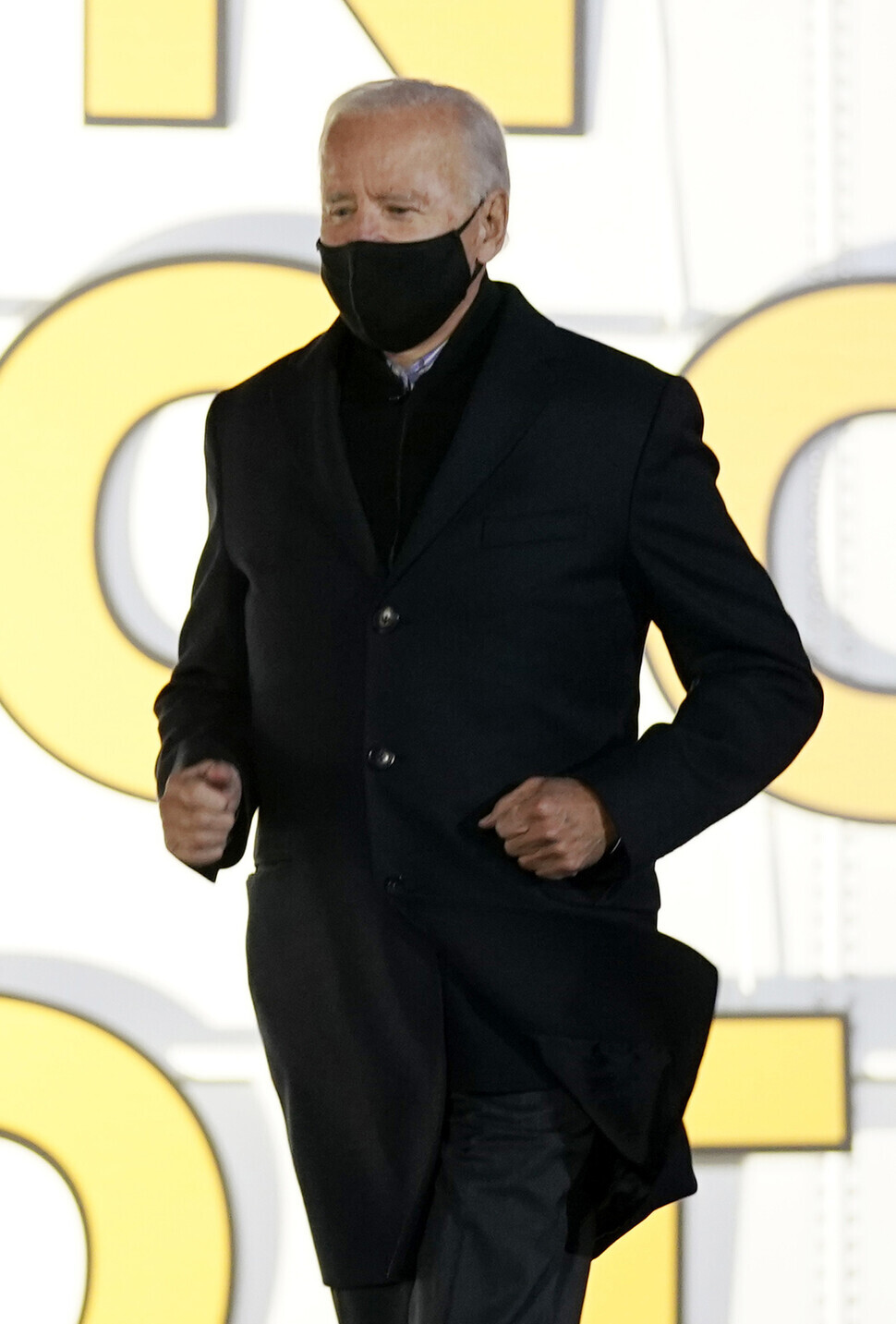hankyoreh
Links to other country sites 다른 나라 사이트 링크
[News analysis] S. Korean foreign ministry aims to contact president-elect before Japan

With just one day left before the US presidential election, South Korean government officials are on the edge of their seats.
For now, countries around the world are still wrapping up their final analysis of the race and assessment of potential scenarios. But as soon as the results become apparent, those countries will be racing to make diplomatic contact with the next president of the US, the most powerful country in the world.
Sources close to South Korea’s Ministry of Foreign Affairs (MOFA) told the Hankyoreh on Nov. 2 they think Joe Biden has a good chance of being elected, but officials seem wary about jumping to conclusions. That position reflects not only clear indications that Donald Trump is gaining ground, but also Trump’s upset victory four years ago, driven by “shy Trump voters.”
There was a considerable buzz back in 2016 when a task force led by the assistant foreign minister and MOFA’s North American Affairs Bureau reportedly foresaw Trump’s victory. This past August, MOFA set up a similar task force for the upcoming US presidential election. The task force coordinated discussion about election trends and post-election actions that should be taken by the South Korean government.
This time around, the task force is headed by a higher-ranking official, Vice Foreign Minister Choi Jong-kun. In addition, a wider range of bureaus connected with South Korea-US relations are represented in this year’s task force, including not only the North American Affairs Bureau but also the Office of Korean Peninsula Peace and Security Affairs and the Bilateral Economic Affairs Bureau.
The task force has also assigned an official to a diplomatic mission in the US to monitor the election and report back over video links. The question of who becomes the next president will inevitably have a major impact on issues of great importance to foreign policy and national security, including the Korean Peninsula peace process, the transfer of wartime operational control (OPCON) of South Korean troops, and the two countries’ defense cost-sharing agreement.
As the old saying goes, well begun is half done, and foreign policy is no exception.
The first significant move South Korea can make with the US’ next president is a phone call from President Moon Jae-in. Prior to that, Moon can send a congratulatory cable to the winner and Seoul can issue a statement, but such moves don’t typically get much attention. It’s the timing of their leaders’ phone calls with the president-elect that the world’s countries will be nervously awaiting.
Since the results of the US presidential election have to be tabulated by each separate state, it will take a while before the final tally is complete. Under precedent, diplomatic outreach to the president-elect kicks off when the outcome of the race becomes clear and the losing candidate makes a concession speech.
When Trump defied all expectations and was elected president in November 2016, the country that moved the fastest was Japan. Shinzo Abe, who was prime minister at the time, called Trump at 7:55 am on Nov. 10, the day after Trump’s election was confirmed, and spoke for about 20 minutes with the president-elect.
South Korean president Park Geun-hye had a 10-minute conversation with Trump at 9:55 am, about two hours later. That was the fastest a South Korean president had ever arranged a phone call with the US president-elect, the Blue House claimed at the time.
CNN reported that the leaders of Egypt, Australia, Ireland, Israel, Canada, Mexico, Saudi Arabia, and Turkey had also spoken with Trump on that day, while adding that the sequence of phone calls was unconfirmed.

What happened next was even more important. Abe lined up a meeting with Trump in New York on Nov. 17, a week later, throwing the diplomatic establishment into disarray.
For the Obama administration, the meeting disregarded the “one-president rule,” under which the outgoing president retains the authority of the office until the president-elect’s inauguration. But as far as other countries were concerned, Japan had stolen their thunder.
As Japan angled for the meeting despite pushback from the Obama administration, a US-Japan summit that had been mulled during the APEC summit in November was reportedly called off.
UN Secretary-General Ban Ki-moon, who was nearing the end of his term and about to return to South Korea, reportedly tried to set up a meeting with Trump, but that was thwarted by the Obama administration.
“[Officials] right now are probably working on the assumption that our phone call should at least be faster than Japan’s,” one South Korean government official said.
The South Korean embassy in the US will lead efforts to make contact with the president-elect. If Trump is reelected, that conversation will follow protocols in the current administration.

But if Biden is elected, the South Korean embassy is expected to try to make contact via Democratic senators and congressmen or even their aides. Since the Biden campaign has refrained from making contact with any foreign figures during the election, the initial outreach is likely to be led by figures loosely connected with the Democratic Party and by Korean-American voting organizations.
The next big move will be Foreign Minister Kang Kyung-wha’s visit to the US, which could take place as early as next week. Her visit was scheduled after US Secretary of State Mike Pompeo’s October trip to South Korea fell through.
But given the peculiar timing of Kang’s visit, so soon after the US presidential election, Seoul is reportedly mulling over how to make the most of the visit. If Biden emerges as the victor, Kang will likely try to make contact with his camp in one form or another.
“It would be good to have an opportunity to convey the South Korean government’s position during a meeting with figures in the Democratic Party without violating protocol in regard to the sitting president,” said a MOFA official.
By Kim Ji-eun, staff reporter
Please direct comments or questions to [english@hani.co.kr]

Editorial・opinion
![[Column] Season 2 of special prosecutor probe may be coming to Korea soon [Column] Season 2 of special prosecutor probe may be coming to Korea soon](https://flexible.img.hani.co.kr/flexible/normal/500/300/imgdb/original/2024/0426/3317141030699447.jpg) [Column] Season 2 of special prosecutor probe may be coming to Korea soon
[Column] Season 2 of special prosecutor probe may be coming to Korea soon![[Column] Park Geun-hye déjà vu in Yoon Suk-yeol [Column] Park Geun-hye déjà vu in Yoon Suk-yeol](https://flexible.img.hani.co.kr/flexible/normal/500/300/imgdb/original/2024/0424/651713945113788.jpg) [Column] Park Geun-hye déjà vu in Yoon Suk-yeol
[Column] Park Geun-hye déjà vu in Yoon Suk-yeol- [Editorial] New weight of N. Korea’s nuclear threats makes dialogue all the more urgent
- [Guest essay] The real reason Korea’s new right wants to dub Rhee a founding father
- [Column] ‘Choson’: Is it time we start referring to N. Korea in its own terms?
- [Editorial] Japan’s rewriting of history with Korea has gone too far
- [Column] The president’s questionable capacity for dialogue
- [Column] Are chaebol firms just pizza pies for families to divvy up as they please?
- [Column] Has Korea, too, crossed the Rubicon on China?
- [Correspondent’s column] In Japan’s alliance with US, echoes of its past alliances with UK
Most viewed articles
- 1AI is catching up with humans at a ‘shocking’ rate
- 2Korea’s 1.3% growth in Q1 signals ‘textbook’ return to growth, says government
- 3Is Japan about to snatch control of Line messenger from Korea’s Naver?
- 4After election rout, Yoon’s left with 3 choices for dealing with the opposition
- 5No good, very bad game for Korea puts it out of Olympics for first time since 1988
- 6Will NewJeans end up collateral damage in internal feud at K-pop juggernaut Hybe?
- 7[Column] Season 2 of special prosecutor probe may be coming to Korea soon
- 81 in 5 unwed Korean women want child-free life, study shows
- 9[Column] Park Geun-hye déjà vu in Yoon Suk-yeol
- 10‘We must say no’: Seoul defense chief on Korean, USFK involvement in hypothetical Taiwan crisis